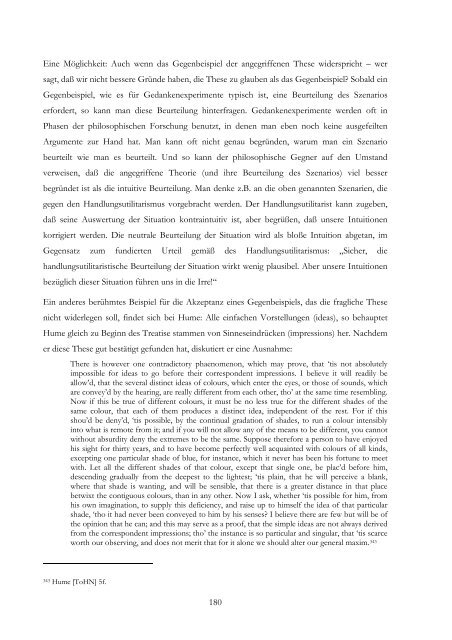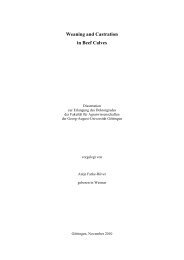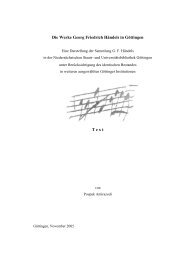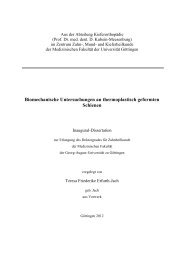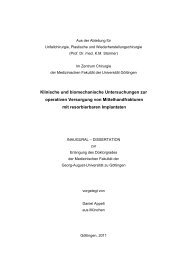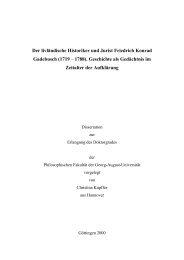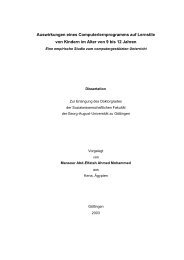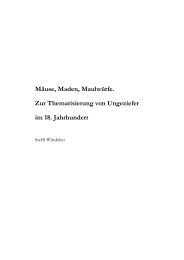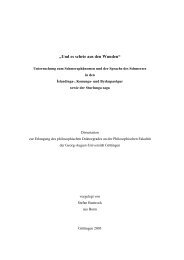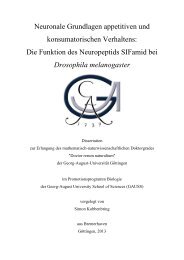Gedankenexperimente Eine Familie philosophischer Verfahren
Gedankenexperimente Eine Familie philosophischer Verfahren
Gedankenexperimente Eine Familie philosophischer Verfahren
Erfolgreiche ePaper selbst erstellen
Machen Sie aus Ihren PDF Publikationen ein blätterbares Flipbook mit unserer einzigartigen Google optimierten e-Paper Software.
<strong>Eine</strong> Möglichkeit: Auch wenn das Gegenbeispiel der angegriffenen These widerspricht – wer<br />
sagt, daß wir nicht bessere Gründe haben, die These zu glauben als das Gegenbeispiel? Sobald ein<br />
Gegenbeispiel, wie es für <strong>Gedankenexperimente</strong> typisch ist, eine Beurteilung des Szenarios<br />
erfordert, so kann man diese Beurteilung hinterfragen. <strong>Gedankenexperimente</strong> werden oft in<br />
Phasen der philosophischen Forschung benutzt, in denen man eben noch keine ausgefeilten<br />
Argumente zur Hand hat. Man kann oft nicht genau begründen, warum man ein Szenario<br />
beurteilt wie man es beurteilt. Und so kann der philosophische Gegner auf den Umstand<br />
verweisen, daß die angegriffene Theorie (und ihre Beurteilung des Szenarios) viel besser<br />
begründet ist als die intuitive Beurteilung. Man denke z.B. an die oben genannten Szenarien, die<br />
gegen den Handlungsutilitarismus vorgebracht werden. Der Handlungsutilitarist kann zugeben,<br />
daß seine Auswertung der Situation kontraintuitiv ist, aber begrüßen, daß unsere Intuitionen<br />
korrigiert werden. Die neutrale Beurteilung der Situation wird als bloße Intuition abgetan, im<br />
Gegensatz zum fundierten Urteil gemäß des Handlungsutilitarismus: „Sicher, die<br />
handlungsutilitaristische Beurteilung der Situation wirkt wenig plausibel. Aber unsere Intuitionen<br />
bezüglich dieser Situation führen uns in die Irre!“<br />
Ein anderes berühmtes Beispiel für die Akzeptanz eines Gegenbeispiels, das die fragliche These<br />
nicht widerlegen soll, findet sich bei Hume: Alle einfachen Vorstellungen (ideas), so behauptet<br />
Hume gleich zu Beginn des Treatise stammen von Sinneseindrücken (impressions) her. Nachdem<br />
er diese These gut bestätigt gefunden hat, diskutiert er eine Ausnahme:<br />
There is however one contradictory phaenomenon, which may prove, that ‘tis not absolutely<br />
impossible for ideas to go before their correspondent impressions. I believe it will readily be<br />
allow’d, that the several distinct ideas of colours, which enter the eyes, or those of sounds, which<br />
are convey’d by the hearing, are really different from each other, tho’ at the same time resembling.<br />
Now if this be true of different colours, it must be no less true for the different shades of the<br />
same colour, that each of them produces a distinct idea, independent of the rest. For if this<br />
shou’d be deny’d, ‘tis possible, by the continual gradation of shades, to run a colour intensibly<br />
into what is remote from it; and if you will not allow any of the means to be different, you cannot<br />
without absurdity deny the extremes to be the same. Suppose therefore a person to have enjoyed<br />
his sight for thirty years, and to have become perfectly well acquainted with colours of all kinds,<br />
excepting one particular shade of blue, for instance, which it never has been his fortune to meet<br />
with. Let all the different shades of that colour, except that single one, be plac’d before him,<br />
descending gradually from the deepest to the lightest; ‘tis plain, that he will perceive a blank,<br />
where that shade is wanting, and will be sensible, that there is a greater distance in that place<br />
betwixt the contiguous colours, than in any other. Now I ask, whether ‘tis possible for him, from<br />
his own imagination, to supply this deficiency, and raise up to himself the idea of that particular<br />
shade, ‘tho it had never been conveyed to him by his senses? I believe there are few but will be of<br />
the opinion that he can; and this may serve as a proof, that the simple ideas are not always derived<br />
from the correspondent impressions; tho’ the instance is so particular and singular, that ‘tis scarce<br />
worth our observing, and does not merit that for it alone we should alter our general maxim. 343<br />
343 Hume [ToHN] 5f.<br />
180


